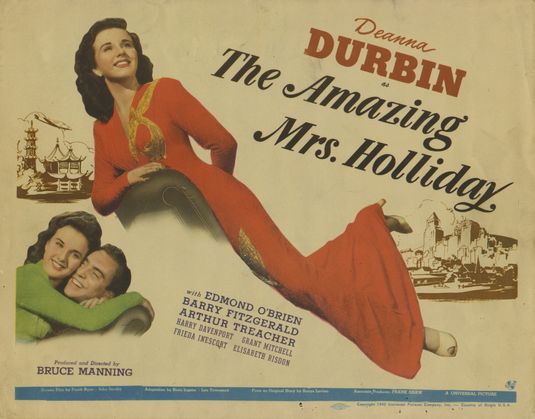Universal’s surprisingly satisfying celebration of its 100th anniversary with a robust slate of classic Blu-ray releases — unlike Paramount, which has outsourced most of its back catalogue — unfortunately did not extend to any films starring Deanna Durbin, who as a teenager in the late 1930s rescued the film from bankruptcy and remained one of the studio’s top attractions for a decade.
But the recently revived Universal Vault Series — the studio’s on-and-off manufacture-on-demand DVD program, not to be confused with the limited-edition TCM Vault, which also offers DVDs from Universal, but (mostly) on pressed discs — has released one of Durbin’s more intriguing films, unavailable since the VHS era since it didn’t make the cut for either Universal’s “Sweetheart Pack” in 2004 or the “Music and Romance Collection” issued by the TCM Vault in 2010. (There are some very minor digital artifacts that would have been worked out in a Blu-ray master, but otherwise this looks as sharp and bright as most of the Universal Vault releases I’ve seen)
“The Amazing Mrs. Holliday” (1943) is not only one of Durbin’s more entertaining efforts from the second half of her career, it has a fascinating backstory that includes a major contract dispute and a bumpy production history (the celebrated Jean Renoir, Durbin’s hand-picked choice as director, was replaced mid-shoot) that between kept the hugely popular star off screen for all of 1942.
Durbin by all accounts was very upset when producer Joe Pasternak, who had guided her early films at Universal, departed after the completion of 1941’s “It Started With Eve” for a long-term deal at MGM, where he went to immediately work with that studio’s stable of Durbin wanabes — Judy Garland in “Presenting Lily Mars” and Kathryn Grayson in the very Durbin-seque “Seven Sweethearts” (both 1942).
An alarmed Durbin, who turned 20 in 1941, went on suspension for six months, demanding that Universal, exclusively her home since 1936, grant her the right to make some films for Pasternak at MGM, where she had briefly been under contract but appeared only in a single musical short. “Get rid of the fat one,” Louis B. Mayer is famously said to have ordered after watching it — he meant co-star Garland, who like Durbin struggled with weight issues — but to his everlasting regret, Durbin was sent into Universal’s grateful arms.
By 1941, Durbin had been surpassed as Universal’s top moneymaker by Abbott and Costello, but she was still important enough to the company’s bottom line that they refused to let Durbin work elsewhere for the rest of her career (It’s fascinating to imagine what might have happened if Durbin had toplined Garland’s box-office breakthrough, “Meet Me in St. Louis”). Universal did mollify Durbin with a fat new contract — by 1945 she was reportedly the top paid woman in the United States — that not only granted her TV residuals for her films from that point (an extraordinary concession in this era) but her pick of directors, producers, and story properties.
Read more: http://www.nypost.com/p/blogs/movies/dvd_extra_deanna_durbin_rene_clair_JvtvF4PAUxfOCbeZeDOygM#ixzz2DTfHtUpT
